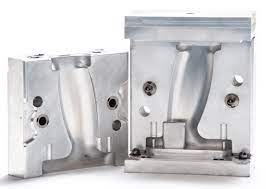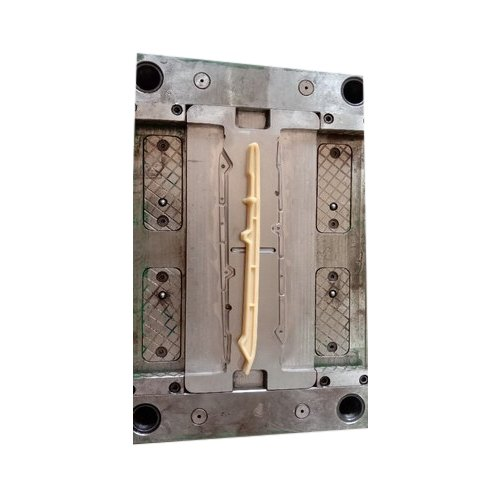
Large amounts of mold manufacture scrap have a negative impact on the profitability of molders. Plastic resin waste due to poorly designed tools, process capability, resin quality, color changes and product contamination are frustrating businesses that seek to be more efficient with materials.
The increase in the frequency of material and color changes caused by the just-in-time production methodology is often the root of the problem. With increasing customer demand for a wide variety of customized products, many companies need to learn how to manage rising plastic scrap rates. One of the best ways to reduce scrap is to increase the focus on purging operations.
Variation in mold manufacture scraps Prices
A molding company's scrap rates were in the range of 10 to 15% when they decided to conduct an investigation. During the study, the molder recorded defect rates and found that the number of defects constantly increased after manual cleaning of the threads.
The company's only option was to take the thread out a second time, but the defect rate inevitably increases again until they adopt a preventive purging regime. As the molder optimized the time of their preventive program, they reduced scrap rates to less than 1%.
The first necessary step for mold manufacture with high scrap rates is to map their number of defects and investigate whether a preventive purge schedule makes a difference.
Using an adequate amount of mold manufacture purging agent
A common cause of increased scrap rates is insufficient purging during downtime and exchanges. When molders do not use enough purging compound, rejection rates increase.
Molders should discontinue the practice of using a predetermined amount of purge compound for each purge. Some companies tell machine operators to use a specific amount of purging agent, taking a fixed quantity approach.
What should be the amount of molding material?
However, the amount of purging compound required for each exchange varies depending on the situation. For example, the more time that has elapsed since thread removal and manual cleaning, the more molders see contamination in their system.
Especially in the case of injection molding machines, carbonization tends to accumulate in areas of low pressure (dead spots) of injection molding machines, such as the following:
- injection nozzle.
- Thread mixing zone • Hot runner points
- tips (pacifier)
- Venting openings.
How mold manufactures inspect the machine?
After each purge, the machine must be carefully inspected to ensure that it has been sufficiently purged.
Plastics mold manufacture must train molding machine operators to purge until cleaning completes, within a certain tolerance range, before contacting a supervisor. It is not recommended to put a machine back into production after using a predefined amount of purging compound.
How to use purging compounds with mechanical purging?
> When using a purge compound to obtain sufficient purge, there are three basic tips that operators should follow:
> Use the maximum safe thread speed when purging and moving the purging compound
> Use maximum safe back pressure when purging and displacing the purging compound
> Keep the thread completely forward while cleaning
The use of high speed and screw back pressure causes greater agitation and turbulence. Moreover, it increases the purification compound's agitation and cleaning capabilities. In addition, keeping the thread forward concentrates the agitation of the screw and the purging compound at the front end of the machine, where color and carbon deposits are often a problem.
Scrap reduction with manual cleaning
A critical component of the molding machine purge is complete manual cleaning of the thread. If threads, barrels, nozzles, dies do not clean for long time, a purging compound may not be sufficient to reduce scrap rates.
Purge mold manufacture compounds work best when used as a preventive rather than a reactive measure. As a last resort, machine operators must clean everything manually and then implement a cleaning program (using purge compound).
Difficulty starting after weekend stops
At the end of the work week, many molding machine operators simply turn off the barrel heaters and believe this is an effective shutdown. When starting the machine on Monday morning, scrap rates are high and it takes a long time to start production.
It is a common misconception that turning off the heat causes the resin to cool and solidify harmlessly. In fact, it can take hours for the plastic in the barrel to cool enough to stop the degradation. During this period, carbonization forms in the cannon and adheres to metal surfaces.
When operators turn off the heat with the plastic in the cannon on Friday night, carbonization builds up on the weekend and slows down production on Monday morning. The most effective solution is to seal the thread and plug before shutting down.
Mold manufacture implementing weekly sealing
Sealing involves the use of a heat-stable purging compound during downtime and prolonged downtime, including periods of preventive maintenance or mold changes. The heat-sensitive resin is displaced by a purging compound that prevents oxygen from entering the thread and cannon while the purging cools.
Upon departure, molders must use another capacity of the purge gun in the system and switch to the next resin. Generally, mold manufacture start making things on swift line.
Weekly sealing also reduces the need for maintenance purging. Carbonization occurs if the resin is kept under heat in the presence of oxygen. However, the degree of carbonization varies in each situation. Some resins enter a danger zone (degradation) more quickly than others.
Regular Cleaning is Important
Although regular and preventive maintenance cleaning is advisable, it is highly beneficial to use a heat-stable purging compound for temporary or prolonged shutdowns and seals.
Cleaning the nozzle and seal ring
After completing the general purging procedures to clean the screw and barrel, it is recommended that the molders load the machine with a small amount of purging compound and perform brief high-speed injections.
This action inserts the purging compounds in tight (narrow) areas and in hard-to-reach places that a purging agent would not otherwise be able to access. Additional areas of your molding machine also benefit from this technique.
Mixing nozzles are well known for having color suspension and suspension of degraded material due to the design. It is important that you clean the machines thoroughly to avoid high scrap rates.
What does mold manufacture recommend?
Mold manufacture of purging compounds recommends different procedures for cleaning hot chambers. Some mold release agents are not suitable for cleaning hot runners, so plastics manufacturers should take this into account when making a purchase decision.
Other purging compounds, however, is easy to use in the closed mold or open mold method. Moreover, it depends on the processed resins, the mold design and the difficulty of cleaning.
Is it good increase temperature?
It is a best practice to increase the temperatures in the hot runner, particularly the door temperatures, to help loosen deposits during purging. Short, high-speed injection (shots) is also useful when purging using open mold procedures.

To purge hot channels with a valve, machine operators must close all channels and place the pins in a closed position to purge problematic channels individually. This technique causes more pressure to be applied to each channel and allows for a more thorough cleaning.
Correct purging procedures are critical to keeping thermoplastic molding machines running efficiently. For more effective cleaning, follow these tips and techniques when cleaning and performing manual cleaning.
How to reduce scrap prices?
Mold manufacture who is unsure how to reduce scrap rates and downtime should continue to research best purging practices. An industry expert is also able to offer guidance on preventive cleaning and maintenance procedures.
By starting to work with a growth mindset, you have the opportunity to create new efficiency opportunities for your business. We recommend that you take advantage of these days to prepare yourself to be even more successful when things go back to normal. Today, we will examine 4 ways in which injection molders and extruders can prepare for growth during slow times.
Tip # 1: Learn new methods and be open-minded about new processes
When we are successful and busy, it is difficult to slow down and see how to improve what you are doing. Now is a good time to take a step back and look at what you can do differently.
Tip # 2: Train your people and improve old habits
Take a look at your current processes and see if there are areas where you can improve. Spend some time focusing on your weaknesses to improve production when things happen again.
For cleaning programs, contact your mold manufacture purging specialist and make sure you are still following the recommended instructions on all shifts. If the performance of your purging compounds decreases over time, there is a good chance that someone is cutting corners.
Tip # 3: Reinforce best practices
As important as it is to recognize the areas where you can improve, it is equally important to recognize the areas in which you excel. Write down what you do well and make sure everyone on your team understands and uses best practices.
Tip # 4: Keep your equipment that is not being used
At times, challenging business conditions may seem like they will never end. This is not a reality. You must prepare to get things up and running again. Keep your processing equipment unused, so it's ready when you get back to 100%. Also, make sure you don't cannibalize your machines for spare parts in the meantime. This strategy is a short-term fix that will come back to haunt you.





